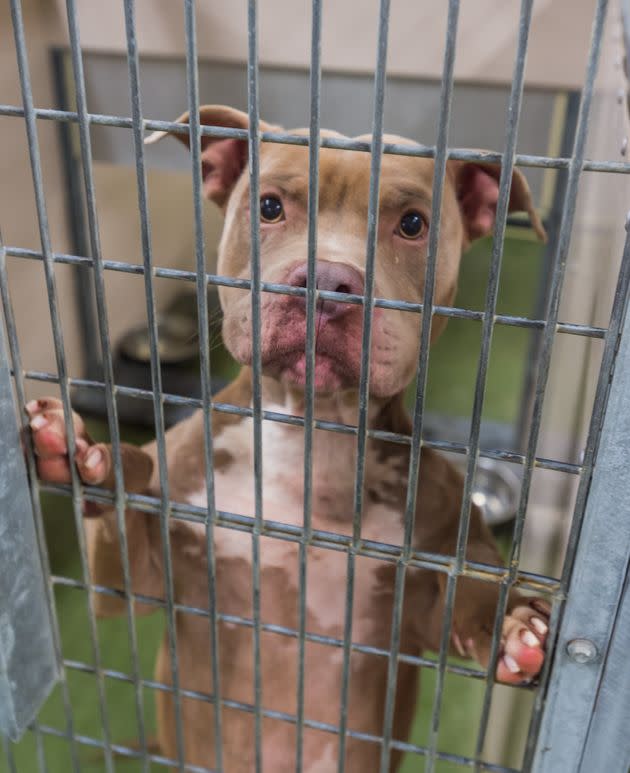Officials Warn of Mysterious Viral Illness Killing Dogs In Northern Michigan
A mysterious virus has been sickening and even killing dogs in northern Michigan in recent weeks, prompting health officials to urge dog owners to ensure their pets are fully vaccinated and keep them isolated if they’re sick.
In Otsego County alone, more than 20 dogs have died within three to four days of showing symptoms of the illness, which are similar to those of the highly contagious canine parvovirus, Otsego County’s animal shelter director, Melissa FitzGerald, told HuffPost on Tuesday.
All of the fatally stricken dogs in the county were not properly vaccinated against the parvovirus and most were under the age of 2 or elderly, she said.
“It’s very scary,” FitzGerald said of the illness, symptoms of which include bloody diarrhea, vomiting, lethargy and loss of appetite. “My dogs are not leaving my property, and I strip when I go home because I don’t know what I will get during the day.”

A pit bull terrier in seen in a cage at an animal shelter. In northern Michigan, more than 20 dogs have died in recent weeks from a mysterious illness that has been likened to the highly contagious canine parvovirus, officials said. (Photo: Heather Paul via Getty Images)
It’s been suggested that the illness may be a new strain of the parvovirus. That’s because dogs believed to have died from it initially tested negative for the virus while alive but were later found with parvo during a necropsy, FitzGerald said.
“So they’re testing negative on intake. However, after dying and doing a necropsy, they’re coming back with parvo. So is it a different strain? Possibly. Is it a strain with something else? Possibly. At this point it’s hard to say,” she said.
FitzGerald said the state is doing its best to come up with a solution but that it needs more canine specimens as part of its research. Asking a pet owner to turn over their dog’s body for a necropsy immediately after its death is “a hard thing,” she acknowledged.
Is it a different strain? Possibly. Is it a strain with something else? Possibly. At this point it’s hard to say.Melissa FitzGerald, Otsego County animal shelter director
Statewide, it’s not clear how many dogs have been affected since parvovirus is not a disease that’s reported to the state veterinarian, according to the Michigan Department of Agriculture and Rural Development, which is investigating the virus.
“What we have is anecdotal information placing the parvo case number somewhere between 15-25 or so, but no confirmation,” MDARD Communications Director Jennifer Holton told HuffPost in a statement Tuesday.
Owners should get their pets fully vaccinated, and if a dog is showing signs of illness they should be taken to a vet and kept at home away from other dogs, MDARD advises. People should also clean up after their pet when walking in public to prevent the virus from spreading, the agency said.
That’s because parvo can spread among dogs through direct contact with an infected dog or indirect contact with a contaminated object, such as a food or water bowl, a collar, or feces, according to the American Kennel Club.
“Protecting animal and public health is one of the department’s key pillars, but it is a team effort,” said State Veterinarian Nora Wineland in a statement Monday. “Dog owners need to ensure their pet is up to date on routine vaccinations as it’s the first step in keeping your pet healthy.”
Because Michigan dog owners can self-vaccinate their pets for parvo by purchasing the vaccine at a farm storm, FitzGerald said to make sure the vaccine, which is administered in a series, is properly delivered. This includes keeping the vaccine continuously chilled.
“Some people don’t know that that vaccine has to be kept at a refrigerated temperature,” she said of people who may leave the vaccine in their car after its purchase, turning it into an ineffective “vial of water.”
“There are a lot of pieces of the pie in this whole thing,” she said.
This article originally appeared on HuffPost and has been updated.
